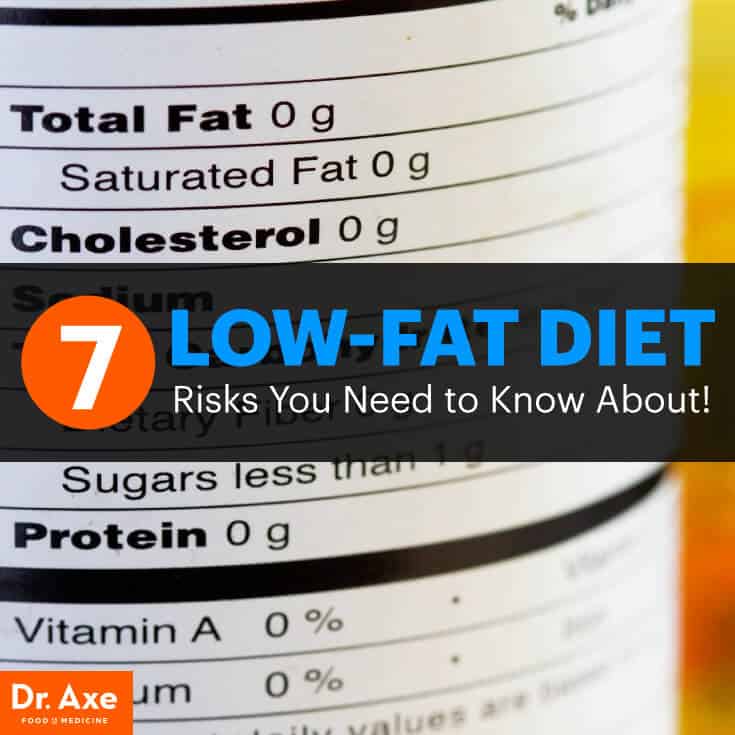 Fats
are an essential nutrient and one of the primary energy sources for the
body. They also play a big role in weight management, absorbing
nutrients, maintaining healthy skin and hair, regulating body
temperature, supporting immune function, insulating internal organs, and
hormonal balance.
Fats
are an essential nutrient and one of the primary energy sources for the
body. They also play a big role in weight management, absorbing
nutrients, maintaining healthy skin and hair, regulating body
temperature, supporting immune function, insulating internal organs, and
hormonal balance.
You can see right off the bat why there are just so
many low-fat diet risks to be aware of!
While a balanced diet that
includes plenty of plant foods, like vegetables and some fruit, is key
for long-term health, fats are actually needed to properly absorb the
fat-soluble vitamins found in many plants — including vitamin A, D, E and K. Fats also make us feel satisfied after eating — which is not just a nice perk that should be overlooked.
Most healthy sources of fat are also ultimate fat-burning foods. Their ability to make our food taste good, turn off hunger and stop overeating has a lot to do with weight management.
Why We Need Fats: The Low-Fat Diet Risks That May Surprise You
Fats
in general have gotten a bad rap in our heart-healthy and fat-obsessed
diet culture. For decades, we’ve been told to put fatty foods like
coconuts, eggs, fatty cuts of meat and full-fat dairy in the “foods to
avoid” category. Since the government’s 1980 Dietary Guidelines
were established over 30 years ago, dietary policy has focused on
reducing total fat in the American diet to no more than 30 percent of a
person’s daily calories. And many of the most popular “diet plans” over
the years have reduced fat to much lower levels than this.
Although
we hear much more about healthy fats in the mainstream media today,
anything high-fat still sets off alarm bells for most of us and raises
concerns about packing on the pounds. Low-fat, diet and light products
of all sorts continue to pack grocery store shelves — but what are the
real risks of consuming these foods over the full-fat varieties?
Not
all fats are created equally and not all affect the body in the same
way. While processed and refined fats found in boxed foods and most
restaurant fare can be harmful, other types of natural fats have
beneficial, life-extending properties. When we miss out on fats in our
diets, we can quickly find ourselves feeling tired, moody, constantly
hungry, unable to kick cravings and resentful over our restrictive
diets.
Some of the biggest arguments for including more fat in
your diet boil down to fat’s ability to help control hormones,
especially insulin. Low-fat diet risks include hormone imbalances and
insulin resistance commonly linked to diabetes, weight gain, gut
problems, cognitive disorders and more.
As famous fat advocate, doctor and author David Perlmutter, MD, puts it in his book “Brain Maker,”
For the greater part of the past 2.6 million years, our ancestors’ diets consisted of wild animals and seasonal fruits and vegetables. Today most people’s diets are centered on grains and carbs — many of which contain gut-blasting, microbiome-damaging gluten whose downstream effects reach the brain. Even setting aside the gluten factor, one of the main reasons that consuming too many grains and carbs is so harmful is that they spike blood sugar in ways other foods, such as fats, meat, fish, poultry, and vegetables, do not.
Basically, you can
think of it this way: In place of fat, most people eat more
carbohydrates. This also includes high-carb foods with plenty of sugar.
Carbohydrates, including whole grains, have been positioned as the
foundation of a healthy diet for decades (does 11 recommended daily
servings of bread, cereal, rice and pasta ring a bell?), but in reality,
they’re highly overconsumed today, contributing to a host of diseases.


No comments:
Post a Comment